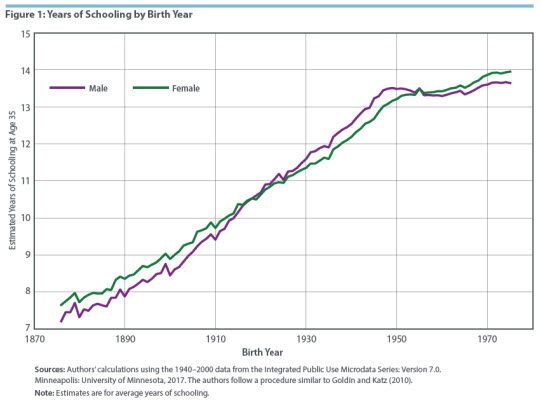Here's a figure showing years of schooling for Americans going back to the 1870s. You can see the steady rise for both men and women up until the birth cohorts, when the educational gains for women slow down and those for men go flat.

In their essay, Neelakantan and Romero argue that this strengthens the case for improving K-12 education, and offer some thoughts. Here are a few related points I would emphasize.
1) Lots of factors affect productivity growth for an economy. But rapid US education growth starting back in the 19th century has been tied to later US economic growth. And it's probably not just a coincidence that when those born around 1950 were entering the workforce in the 1970s, there is a sustained slump in productivity that lasts about 20 years--into the early 1990s.
2) One reason for the rise in inequality of incomes that started in the late 1970s is that the demand for high-skilled workers was growing faster than the supply. For example, the wage gap between college-educates worker and workers with no more than a high school education increased substantially. As Neelakantan and Romero write: "This slowdown in skill acquisition, combined with growing demand for high-skill workers, contributed to a large increase in the `college premium' — the higher wages and earnings of college graduates relative to workers with only high school degrees." When educational attainment went flat, it also helped to create the conditions for US inequality to rise.
3) When a society has a period of a couple of decades where educational attainment doesn't rise, there's no way to go back later and "fix" it. The consequences like slower growth and higher inequality just march on through time. Similarly, the current generation of students--all of them, K-12, college and university--will be the next generation of US workers.